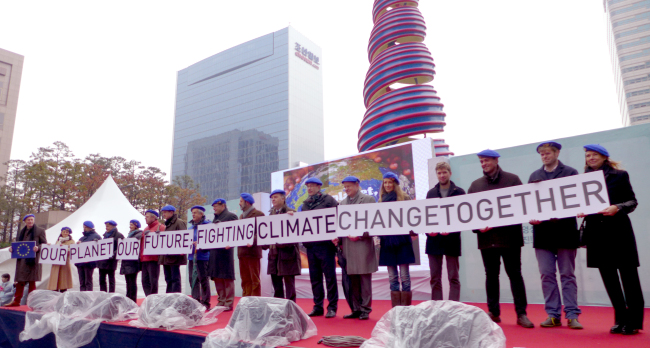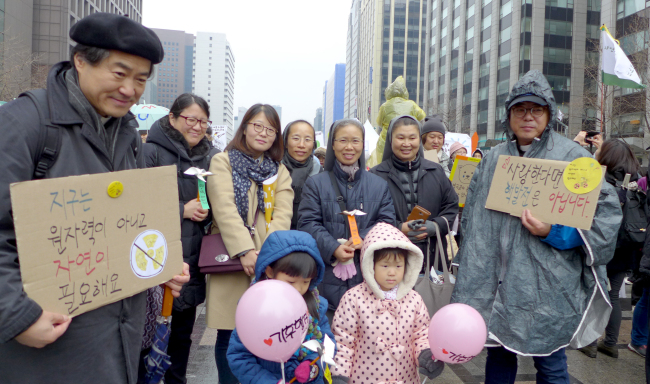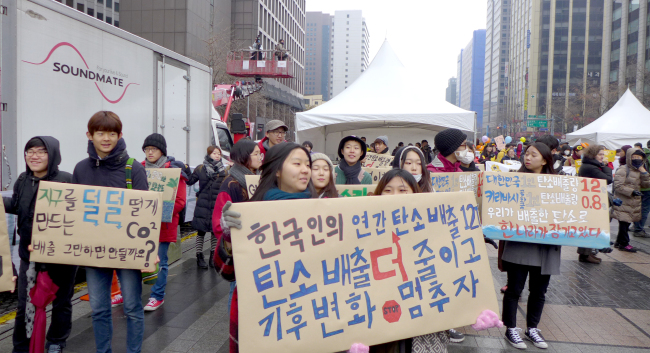A day before the 2015 United Nations Climate Change Conference in Paris kicked off Monday, citizens and diplomats marched across central Seoul to urge the negotiating world leaders to live up to their promises of cutting greenhouse gas emissions and capping the global temperature rise to 2 degrees Celsius beyond preindustrial levels.
Holding banners reading “Our planet, our future, fighting climate change together” and “100 percent renewable energies for you and me,” 18 European Union missions and various environmental organizations Sunday walked along the Cheonggyecheon Stream and participated in talks, part of an awareness campaign joined by citizens in 70 countries around the world.
 |
| Eighteen EU diplomats take part in an event in Seoul on Sunday intended to raise awareness for the 2015 United Nations Climate Change Conference in Paris. They walked with environmental organizations and citizens along the Cheonggyecheon Stream in downtown Seoul and participated in concerts. Joel Lee/The Korea Herald |
“If the global temperature rises by 2 degrees Celsius, scientists say our planet will be swarmed with flood and drought, and by 3 degrees, the Amazon tropical forest will disappear and massive food shortages and migration will wreak havoc on Earth,” Mayor Park Won-soon said in a video clip recorded earlier for the event, which was organized by Green Peace, Climate Action 2015, Green Environment Youth Korea and civic organization Avaaz.
“In spite of the urgency, there are still people who trivialize climate change. We must collect our wisdom and will before it is too late. For our shared sustainable future, the global community must act together.”
In fighting climate change, the mayor stressed, there can be no disagreement between nations and states and cities and citizens. Conserving and handing our planet over to later generations must be our utmost task, he added.
 |
| Participants hold placards reading “Earth needs nature, not nuclear power” and “If you love, nuclear power is not the answer” at the Cheonggye Plaza in Seoul on Sunday. Joel Lee / The Korea Herald |
“We are hopeful that an ambitious and legally binding agreement in reducing emissions by 40 percent of the early 1990s level will be reached by the European Union,” the Irish embassy’s deputy head of mission David Murphy said at the event, adding that a “Low Carbon Development bill” was progressing through the Irish parliament.
Ireland derives the bulk of its energy from oil, natural gas, coal and peat, as well as offshore and onshore wind sources, he added, while the island country continues moving toward more renewable sources.
The Paris meeting, known as Conference of the Parties 21, will attempt to secure a legally binding agreement among the 200 participating countries, based on submitted national plans detailing the means and objectives of cutting emissions.
The issue at stake is devising collective accountability between large and small, developed and developing economies, according to analysts, as previous efforts, including the 1997 Kyoto Protocol and 2009 Copenhagen Summit, failed to bridge differences over responsibilities.
Scientists have expressed skepticism over the ability of participating negotiators to reach the target, noting the pledges were “voluntary” and likely to be “compromised” between what was necessary and what was politically and economically feasible back home.
“In effect, the countries are vowing to make changes that collectively still fall far short of the necessary goal,” the New York Times wrote Saturday, “much like a patient who, upon hearing from his doctor that he must lose 50 pounds to avoid life-threatening health risks, takes pride in cutting out fries, but not cake and ice cream.”
By Joel Lee (joel@heraldcorp.com)
 |
| Participants hold placards reading “A Korean’s annual carbon emission is 12 tons. Let’s reduce our carbon footprint more and stop climate change” at the Cheonggye Plaza in Seoul on Sunday. Joel Lee / The Korea Herald |

